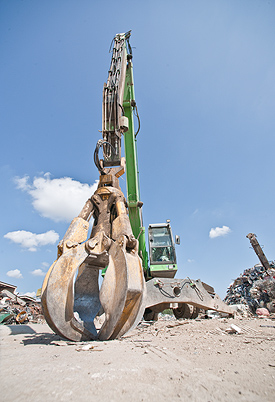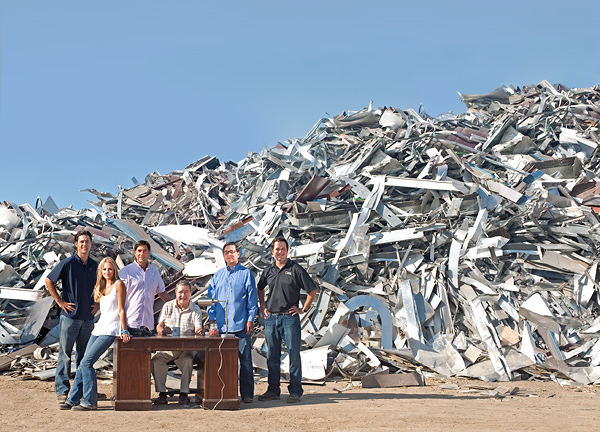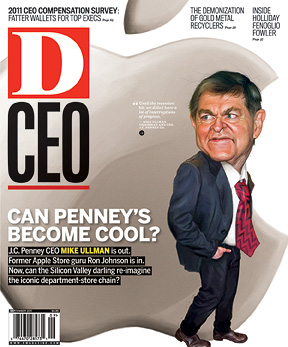Much of their discussion about Gold Metal will focus on that testing, which the recycling company commissioned voluntarily as part of its application for a so-called municipal setting designation on its property. Based on a state statute intended to expedite addressing contamination involving non-potable water, the MSD—which is now pending before regulators—would make it easier for Gold Metal to sell its acreage, or buy more, if it ever chose to do so. Any contaminants the testing discovered do not threaten it or its neighbors, the company contends, because the toxins are isolated, don’t impact the water table, and are capped with concrete.
Blazer, who grew up in Oak Cliff, starts off by telling the gathering that she was disturbed to see all the scrap yards on South Lamar when she returned to Dallas after college. She couldn’t figure out why developers weren’t coming into the area, she says. Then she learned about “the chemicals found in the soil and water” beneath Gold Metal, and began to understand. The testing had revealed arsenic, benzene, lead, xylenes, and “petroleum stuff” in the Gold Metal soil, she says. Some of the chemicals are cancer-causing, while “volatile organics” from all the company’s vehicular traffic can lead to lung disease, she says.
“There are two faces of Gold Metal,” Blazer says. “There’s the PR face—they bring jobs to the community. The question I have is, how many who are employed from the community suffer from environmental effects? And what kind of jobs do those people have? Are they liveable-wage jobs?

Actually, chimes in Clark with W&M Environmental, that’s not exactly right. “Our firm prepared that [environmental] report,” Clark says. “The site [previously] had two gas stations on it, a cement plant, an iron plant. Almost all the contamination was not from Gold Metal. We find lead everywhere in Dallas. And no one is using the groundwater. So the application for an MSD makes sense. Contaminated sites are developed all the time.”
Blazer, though, is having none of it. “There may be limited exposure to soil and water on the site, but anything off-site, there may be plenty of exposure,” she says. “It may be capped, but it’s important to know what’s around there … and what happens on its way to the Trinity River. This plume can contaminate other soil. And, we’re not even talking about the air [yet].”
Muhammad, of the Nation of Islam, agrees with this. “The people in the community have to be educated that there is a danger,” he says. “We should not put on the kiddie gloves with Gold Metal or anybody else.”
Others at the meeting also want to talk about Gold Metal. Rev. Britt says Gold Metal is one of the businesses contributing to the “stereotyping and degradation” of South Dallas. Such companies “help keep our neighbors poor” and “literally keep other businesses out,” he says.
Price, the ex-DISD trustee, is more pointed still. Every August, he says, the district is forced to pay for new air-conditioning units because thieves strip the old units for their copper and then take the copper to Gold Metal, where they sell it. (Gold Metal denies this, saying it documents every transaction and meets regularly with Dallas police detectives to combat potential scrap-metal theft.)
Price also raises the possibility of a class-action lawsuit against the recycling company. “We cannot let our neighborhood become a dumping ground for every business nobody wants!” he says.
Alvin Gray, who lives in the neighborhood across the street from Gold Metal but doesn’t work for the company, has a different view. “They’re nice people,” Gray says of the Goldbergs. “Why not let them clean it up? They’re bringing jobs. There was a service station there, with underground tanks. You can’t just pick on Gold Metal.”
“I like the Goldbergs, too,” Rev. Britt says. “But I don’t like what the business represents in our community.”
Somebody else agrees and adds, “You don’t bury your head in the sand.”
“No, don’t do that,” Blazer quips. “It’s contaminated!”
Then everyone laughs.
Neighborhood Improvements
Back on South Lamar a few weeks later, the objects of all this criticism are sitting in the Gold Metal conference room, trying to explain their unglamorous business to a reporter. “Back in the ‘70s, we were junk dealers,” says Neil Goldberg, 57. “In the ‘80s and ‘90s, we were scrap dealers. Now we’re recyclers.”
Neil and Kenny are somewhat distracted this afternoon, because a small fire had broken out moments before in one of the company’s big sheds. Sparks from a welder’s torch ignited some cardboard boxes containing scrap metal, Neil explains, but the Dallas fire department responded and extinguished the blaze quickly. (There was no metal loss, no insurance claim filed, and no one was hurt, Neil said later.)
The Goldbergs are acutely aware of their detractors, like those at the Holmes Street community center. But they insist that, besides providing much-needed local jobs, they are a force for positive change in the neighborhood. Says Neil: “We’re part of the solution.”
The scrap yard is hidden from South Lamar Street by a nine-foot wall, the Goldbergs point out. They’ve unveiled plans to spiff up the street with park benches, new lighting, big sidewalks, and bike racks. They’ve also purchased a building across Lamar, shut down three bars that were operating inside, and now aim to rent the building out for light-retail uses or as a dental clinic.
In June, the Dallas City Council OK’d the Goldbergs’ plan to rezone and shift some of their operations to a different part of the scrap yard. The council agreed the adjustment was needed to compensate for land Gold Metal will lose when a freeway ramp linking highways 45 and 175 is built, to straighten out the so-called “Deadman’s Curve” on 175.
“We’ve been here a long time. We spend most of our time on Lamar Street,” Neil says. “We’ve been successful, and [the plan for new lighting and so on] is an opportunity to improve working and living conditions in the neighborhood. It also helps us increase the value of our property. We are businesspeople; we look for opportunities.”
Eventually, the Goldbergs say, those opportunities could include selling the South Lamar location to a big-box retailer. However, they insist, any such decision will come on their terms—when they, and the market, determine the timing is right.
Later this same afternoon, though, the Goldbergs will be reminded of the difficulty of doing business on their own terms. At 3:52 p.m., Tod Robberson posts a long story about the just-extinguished fire at the scrap yard on the Morning News website. Someone who lives across the street had called to tip him off, and Robberson had rushed right over to check out the action himself.
After recalling three other fires at Gold Metal since 2003, he writes: “It sure seems to me that a business with this kind of a record should face some kind of investigation or something.”
An Unwavering Message
Tod Robberson, an editorial writer for the Dallas Morning News, has written frequently for the DMN about Gold Metal Recyclers. Here are edited excerpts from our e-mail interview with him.
D CEO: The area of South Lamar Street near Gold Metal is brimming with liquor stores, machine and tire shops, wrecking yards, other recycling companies, even an old Procter & Gamble soap factory. So why has the Morning News put a laser focus on Gold Metal, to the (near-) exclusion of these other rough-looking, non-residential enterprises?
Tod Robberson: The Morning News has not put a laser focus on Gold Metal Recyclers to the (near-) exclusion of others. Our consistent laser focus is on the bad zoning designs that placed heavy industry in southern Dallas next to residential neighborhoods. Heavy industry is an anachronism in Dallas’ urban core, and it is particularly wrong to have heavy industry next to residential neighborhoods. This message has not wavered, whether we were focusing our editorial commentary on Gold Metal, Okon Metals, Oak Cliff Metals in Cadillac Heights or the old lead smelters that existed along the Trinity years ago. Our focus on one company or another often depends on efforts by those companies to win City Council approval for zoning changes, as was the case in our lengthy series of editorials successfully arguing for denial of Oak Cliff Metals’ request to expand in Cadillac Heights.
D CEO: The Goldberg brothers contend that they are a major provider of decent-paying jobs for the area, and that many of their employees live in homes nearby. Especially at a time when jobs are so hard to come by—especially in South Dallas—why is it necessary or appropriate to target (or hassle) one of the area’s few major employers?
TR: We have no quibble with the type of work the Goldbergs perform and welcome the job opportunities they create. Those jobs would not disappear if the Goldbergs moved to a more suitable location in a dedicated heavy industrial zone away from residential neighborhoods. The recent fires and groundwater contamination reports at Gold Metal bolster our concern about the appropriateness of a heavy industrial facility next to a residential neighborhood. The lead smelters that previously operated on South Lamar and Cadillac Heights also provided lots of jobs, but sometimes, other factors must take priority over the small number of local hires these heavy industrial facilities provide.
D CEO: The Observer’s Jim Schutze has floated the theory/explanation for your Gold Metal coverage that the Morning News has vested editorial (and perhaps land-holding) interests in the success of the Trinity River Project, and that the Trinity project and its developer-backers would benefit from removing “blights” like Gold Metal. Is there any truth to this?
TR: Mr. Schutze’s assertions have no basis in fact. Our editorial campaign has one purpose only: to create a greater economic balance between northern and southern Dallas and to help southern Dallas residents obtain a quality of life that more closely matches that of northern residents. This goal cannot be met when large numbers of southern Dallas residents must contend with the property-devaluing effects of heavy industry in their neighborhoods. Our support of the Trinity River Project is consistent with the advocacy of city planning and zoning staff and the Forward Dallas redesign mandated by the City Council. These plans call for limiting all development along the Trinity to light industrial, retail, commercial and residential zoning. Since Gold Metal and other scrap yards are classified as heavy industrial operations, the city’s plans are for them to be phased out. Even Gold Metal acknowledged in its rezoning request that it would eventually have to comply with the Trinity River Master Plan.






